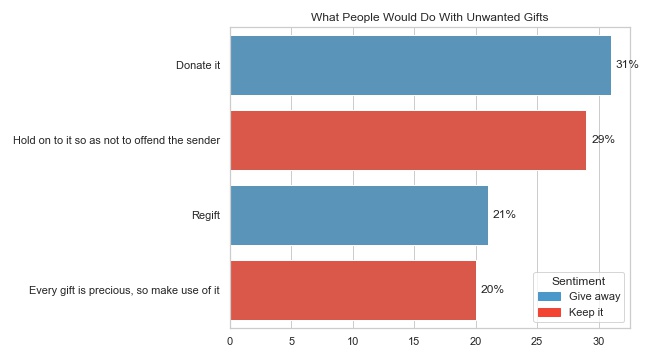The problem of the procedure for dealing with unwanted gifts is not a new one. Since the very first gift was given, the problem has existed. These days we call the process of giving away unwanted gifts regifting.

Most people feel a bit unsure whether or not it is rude to give away a gift they received in the past.
Research has shown that most givers focus on the moment someone receives the gift and not what happens with it afterward. Therefore it is not rude to give away a gift unless it is something especially handmade for you.
In this article, we will examine surveys and research carried out on this topic. Before we start, maybe we should establish if this is a widespread problem or not.
Survey of Gifting & Regifting
A study from Personal Creations revealed that a majority of people would prefer to regift unwanted gifts.

Interestingly, the study also revealed that regifting seems to be more of a female activity with far more women regifting than men. Housewares (probably the least personal gift) are the most regifted items.
Just for clarity’s sake, we are going to include selling a gift as part of the wider definition of Regifting.
Do People Care If You Regift Their Gift to You?
Research has shown that the average gift-giver does not think past when the gift is given.
So, when your aunt sends you a sweater, she imagines your reaction at the point you receive the gift but does not go on to consider if you would ever wear the garment. This may go some way into making you feel better about regifting.
There is an amusing, but true, story from New Zealand where there is a community website called “Trade Me”. Immediately after Christmas, this website gets inundated with items put up for sale as unwanted gifts. Something in the region of 200,000 items, which again shows the scale of the problem.
Anyway, a man from a place called Taranaki had received some cutlery from his mother-in-law, and he placed them for sale on Trade Me, as “an unwanted gift – ugly cheese knives”. You have to give him full marks for honesty, but the point of the story is that his mother-in-law saw the advert. You can imagine that this would be pretty embarrassing, and she would be mad.
However, she was fine, after she explained that she had been given the knives as a gift, and they had been sitting in the garage for years before she regifted them.
Setting Some Ground Rules
Now that we have already established that generally, people do not think past the joy of the moment of giving. They are made happy by the act of giving and assume that the recipient will also be happy on receiving the gift.
In many ways that is the end of the transaction. If there is a subsequent transaction when the gift is regifted, then it is doubling the joy provided by one item.
Perhaps we should lay out a set of guidelines or rules to do with regifting, to ensure that the outcome for everyone is happy.
1 – Do not regift anything handmade
If somebody has invested time in making an item for you, it is a much more complex situation than a store-bought item. The gift will contain just a little bit of themselves in the design and manufacture. If you give that personal gift away, you are making a statement about them, and their value to you.
In the case of a hand-made gift, although the giver has passed the item to you, they will always retain some degree of emotional ownership of the item, as the creator.
They will not just forget about it at the moment of giving (as described earlier). At some stage in the future, they may wonder what happened to the gift and awkward moments could ensue for both parties.
2 – Only regift a new item
Only regift unused items, in their original condition, and their original packaging.
Giving someone a gift that is used or no longer new is sending a strange message to the recipient. If you do give away an item that is no longer new, do not call it a gift, just ask them if they would like the item, with the option to say no, as part of the conversation.
It is best to avoid giving used items altogether as it is fraught with problems.
3 – Think about what you are regifting and who you are regifting to
Most people are being generous when they give a gift, new or regifted. They want the recipient to appreciate the gift. Do not simply select something that you do not want and pass it on randomly. Try to match the item with someone who probably will be delighted with the gift.
Say for example in the month before Christmas you had been looking at electric drills, and you had investigated the various drills available and taken great trouble to buy the electric drill of your dreams. Then at Christmas, someone else, who knew you wanted an electric drill buys you a beautiful drill, but one that does not have the features you wanted and is included with the one you bought.
Now, after Christmas, you have two electric drills. You scratch your head and wonder what to do with the drill, then you remember that it is your sister’s birthday next month. You look at the unwanted drill and think, “it sure is a nice drill and costs far more than I usually spend on my sister”, so you give it to her.
She unwraps the drill and expresses her thanks because she is polite, but inside she is wondering why you are crazy enough to buy her an electric drill. It is not your normal kind of gift.
It plays on her mind and eventually, she concludes that it must be something you are regifting, especially after you have been raving about your new electric drill.
Far better you resell the drill if you do not have anyone who would genuinely like it.
4 – Regift an item in a different circle of friends
The only way that regifting works is when neither the person who gave you the gift originally nor the person you are giving it to, know each other or have any chance of meeting. Regifting among the same circle of friends, or your family, is very likely to lead to people getting their feelings hurt.
The person who gave you the gift does not want to feel that you cared so little that you would just give her present away, and the one you give the gift to, does not want to know that you are just passing on something you did not want.
5 – Be discreet when regifting
Regifting can be amazingly successful if you follow these rules. The ideal situation is where only you know that the item is regifted. By allowing the recipient to find out, you are diminishing the value of the gift in the eyes of the recipient.
So, be careful not to make one of the following mistakes:
- Giving a birthday gift when the item has scraps of Christmas wrapping still attached to the box.
- Missing bits of the packaging, like the foam that holds the item in place within the box.
- A gift tag inside the box from the original giver.
- Your name is written on the packaging or the box.
- Personalization with your name or an inscription is visible.
It May Not Be as It Seems
The fact that the topic of regifting is frequently the subject of the discussion illustrates the sensitivity of the topic in the minds of the public. Yet, research indicates that we are possibly placing too much emphasis on regifting and could be seeing a problem where none exists.
A study from Harvard University took a closer look at the practice of regifting and into the common view that the original giver is offended when their gift is regifted. It also looked at why the recipient might feel that regifting is as bad as throwing the gift away.
The result of the research (in a simple form) is that recipients completely overestimate how bad the original giver would feel if they discovered a gift had been regifted.
It turns out the givers feel that when they give a gift the ownership passes to the recipient to do what they wish with it. However, recipients, believed that the original giver retained some say in what happens to the gift.
I hope that makes you feel more positive about regifting.

Sophie Hammond is a journalist, psychologist, and freelance speechwriter for people in politics and business. She lives on the edge of the Rocky Mountains with her dog and a lifetime supply of books. When she’s not writing, she can be found wandering through nature or journaling at a coffee shop.

